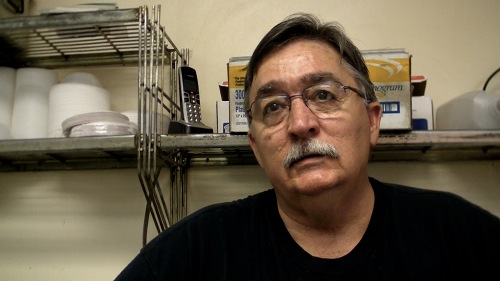An explanation: My roommate and I spent three days living on the streets to learn about the homeless experience in Columbia, S.C. Now I'm digging deeper into the issues and writing about them at www.HomelessInColumbia.com.
Columbia's Winter Shelter closed for the spring Thursday morning, sending hundreds of the city's homeless back outside at nights.
"250 people are headed nowhere," said Billy, a 56-year-old homeless man who'd been staying at the Winter Shelter. The shelter's exact capacity is 240, but the fact remains: Living arrangements are up in the air.
Billy, who withheld his last name, listed the same potential sleeping spots as many others facing the same predicament: parking garages, abandoned houses, the woods. If there is an unoccupied nook or cranny downtown, odds are the homeless scoped it out Thursday night.
My homeless friend Tommy Capps said the streets would be teeming with people at nights:
Cooperative Ministries Executive Director David Kunz, whose organization helps fund the Winter Shelter, said there will not be enough beds in other area shelters to absorb the 240 homeless who left Thursday morning.
"The good majority of them will be sleeping outside," Kunz said.
This happens every year. The shelter won't reopen until October, so downtown residents and business owners will have an increased number of outdoor neighbors throughout the warmer months.
Steve Rowland, owner of Drake's Duck-In on Main Street, said his problems are about to multiply: panhandling during lunch hours, drunken confrontations with customers, defecation and urination in front of his store at night. He's owned the restaurant for 40 years, and he says he knows people who have been homeless that entire time and made no attempts at getting jobs.

"I didn't inherit the responsibility for these irresponsible people," Rowland said. Every morning, he has police escort his manager into the store in case someone is sleeping on the front porch again.
Dorothy Thompson, who runs T.O. Thompson Jewelry Repair with her husband Harold, said she's more concerned about prisoners being let off at a nearby bus stop than about the homeless, whom she sees as mostly harmless and in need. Still, she said she had to put up a chain-link fence last summer to keep people from sleeping on the stairs behind the store.
Is it safe to go downtown at night? Columbia Police Chief Tandy Carter said that only 2 or 3 percent of Columbia's homeless are criminals, and that they tend to commit more property crimes -- specifically auto break-ins -- than violent crimes.
"Homelessness is a public health concern, not a police concern," Carter said. "The enforcement end, to us, is not as important as trying to line them up with the right services."
What if the Winter Shelter were kept open year-round? Certainly, some people would get complacent and learn to call it home.
But for the ones who are still trying, a shelter is a chance to save money. Here's a common scenario: A man stays in the Oliver Gospel Mission's transient dorm for 30 days, at which point shelter policy dictates he has to leave for 14 days so his bed can be offered to someone else. For those first 30 days, he has no housing costs and can save his money toward more permanent living arrangements.
For the 14 days outside the mission, though, he can either live on the streets for free -- and run the risk of being robbed in his sleep or arrested for urban camping -- or he can check into a hotel room. He chooses the hotel.
Say the man pays $40 a night at the hotel. Over 14 days, that costs him $560. In other words, he's paying a month's worth of apartment rent for half a month in a hotel. So much for savings.
When it comes to nighttime on the streets, one thing is different this year: the Clean and Safety Team. Funded by private donations and a special tax on downtown businesses, these goldenrod-clad guards patrol the downtown area. Their job is broad-ranging, but part of it is to move homeless people along when they're caught sleeping downtown.
Until recently, the yellowshirts (as they are nicknamed) would call it quits around 11:30 p.m. Homeless people knew this, and they waited until then to lie down.
Now, the yellowshirts have a third shift that goes late into the night. There are two ways to look at this:
- The streets will be safer at night. Daniel Long, the team's homeless outreach coordinator, called the yellowshirts "the eyes and ears of law enforcement" and said they've helped solve several crimes downtown with the cooperation of the homeless.
Tommy has expressed concern about the volatile mix of persistent yellowshirts and tired, frustrated street sleepers. Tommy is himself non-confrontational and carries no weapons, but all it would take is one belligerent homeless person to turn things awry.
"One of them could make 20 of us look bad," Tommy said.